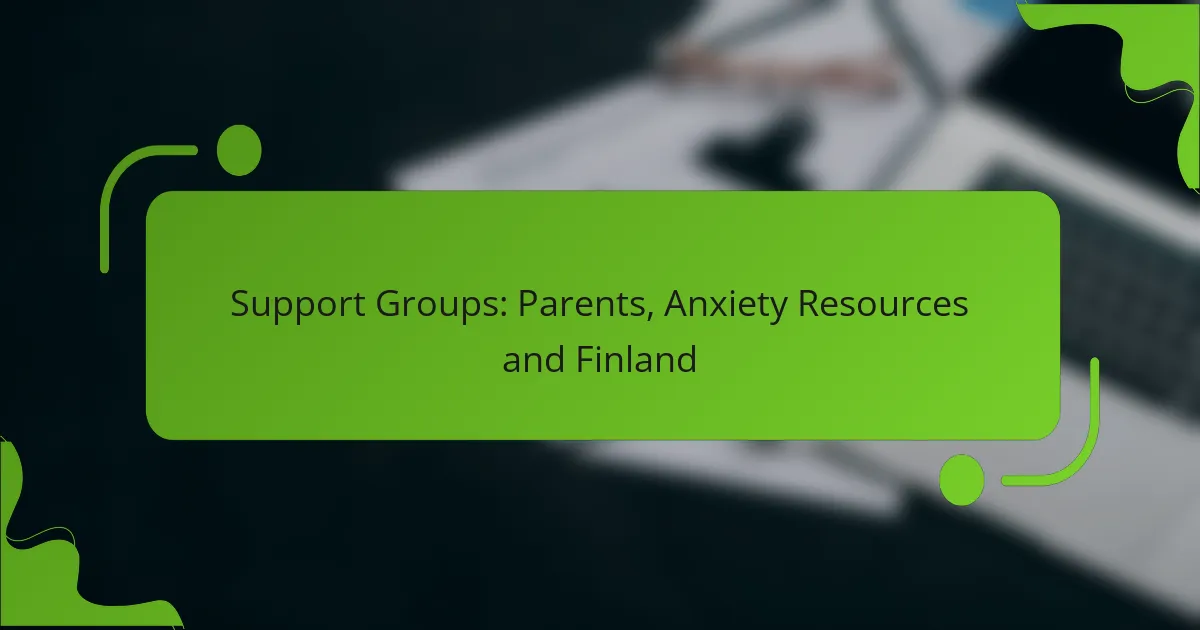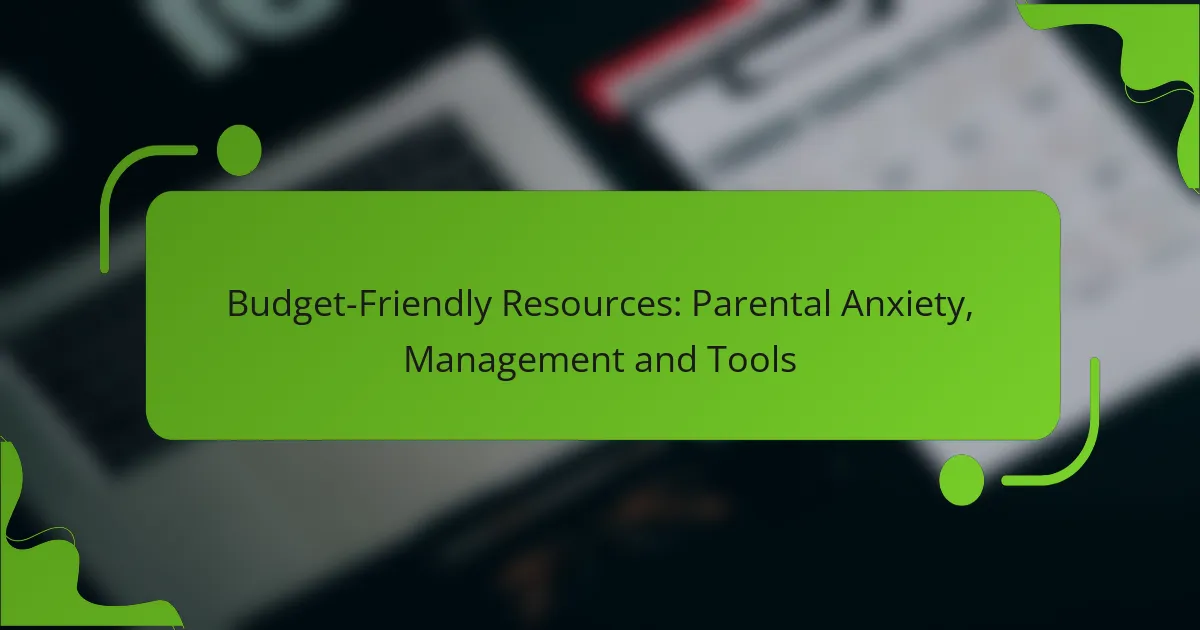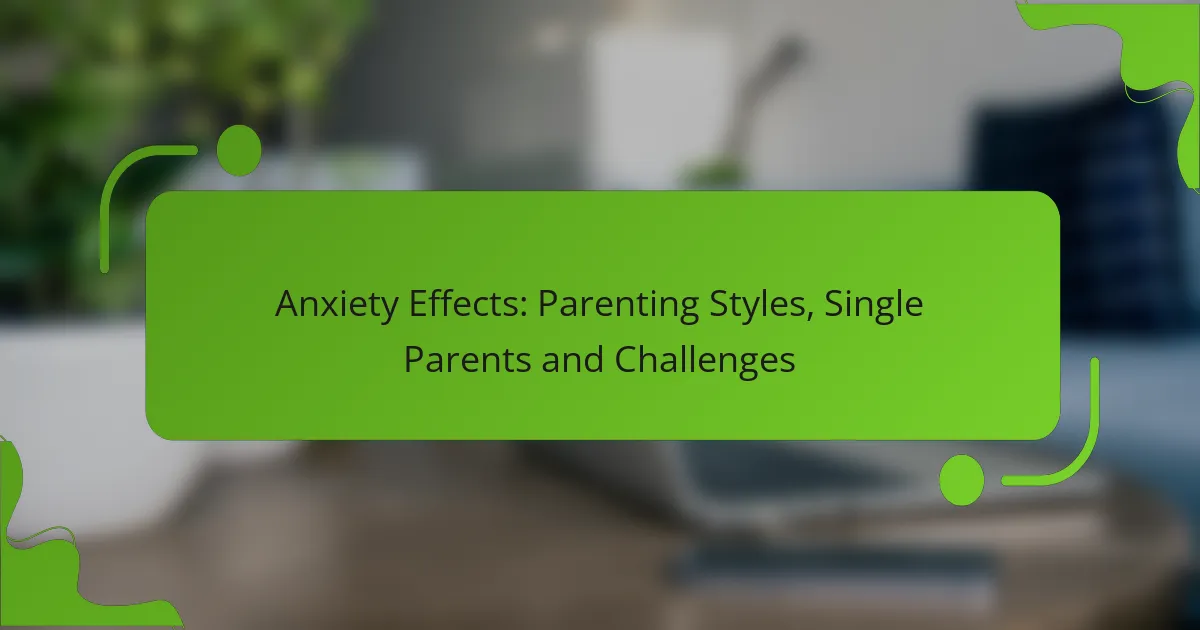Suomessa vanhemmat voivat hyödyntää erilaisia tukiryhmiä, jotka tarjoavat sekä emotionaalista että käytännön apua. Nämä ryhmät keskittyvät muun muassa ahdistuksen hallintaan ja vanhemmuuden haasteisiin, ja ne ovat saatavilla sekä paikan päällä että verkossa.
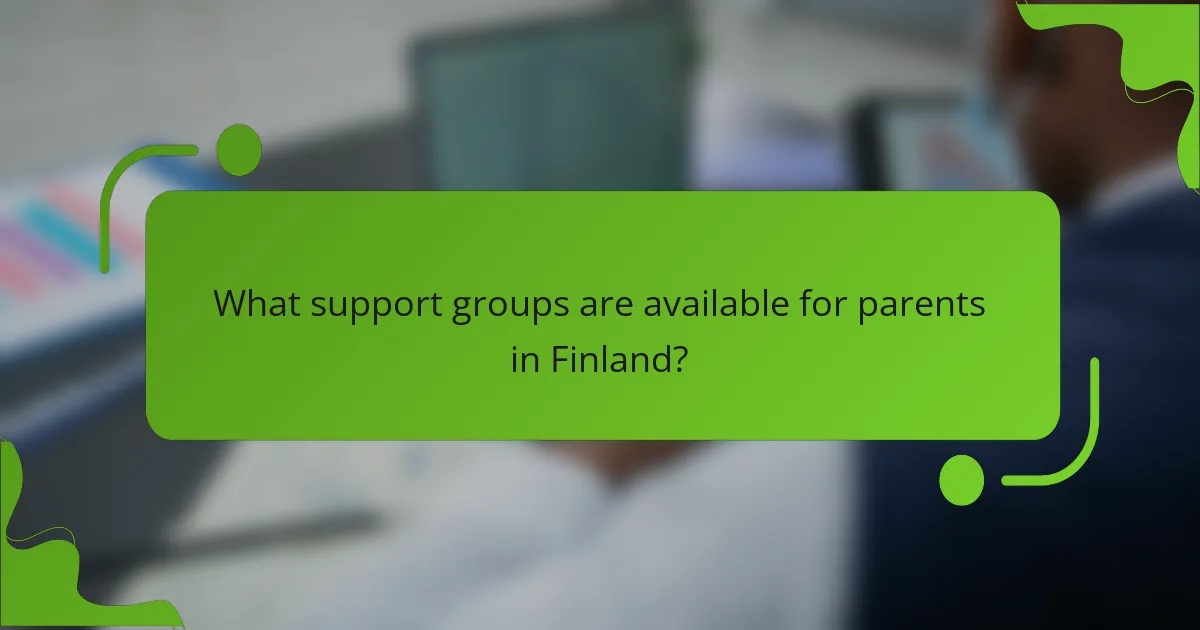
What support groups are available for parents in Finland?
In Finland, parents can access various support groups that provide emotional and practical assistance. These groups cater to different needs, including anxiety management and parenting challenges, and are available both in-person and online.
Parenting support groups in Helsinki
Helsinki offers numerous parenting support groups that focus on various aspects of child-rearing. These groups often meet weekly and provide a safe space for parents to share experiences and strategies. Some notable organizations include the Helsinki Family Centre and local community centers.
Many of these groups are facilitated by professionals, such as psychologists or social workers, who guide discussions and offer expert advice. Participation is typically free or involves a small fee, making them accessible to most families.
Online support communities for parents
Online support communities for parents in Finland have gained popularity, especially for those who prefer virtual interaction. Platforms like Facebook and specialized forums offer spaces where parents can connect, share advice, and seek support from others facing similar challenges.
These communities often host live chats, webinars, and Q&A sessions with experts, allowing parents to gain insights on various topics, including anxiety management. Joining these groups is usually straightforward, requiring only a registration process on the respective platform.
Local meetups in Tampere
Tampere hosts several local meetups for parents, focusing on building connections and sharing parenting tips. These gatherings can range from casual coffee meetups to structured workshops, providing a mix of social interaction and learning opportunities.
To find local meetups, parents can check community boards, social media groups, or websites dedicated to family activities in Tampere. Many meetups are organized by local parenting organizations and may involve a nominal fee to cover venue costs.
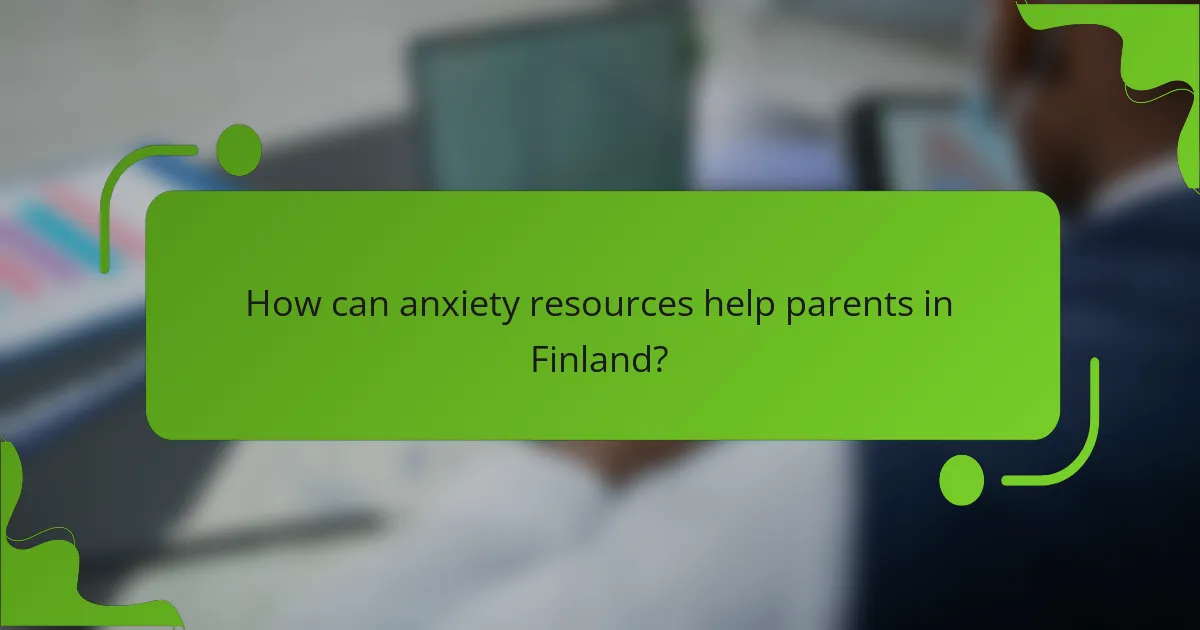
How can anxiety resources help parents in Finland?
Anxiety resources provide essential support for parents in Finland by offering tools and strategies to manage anxiety effectively. These resources can enhance emotional well-being and foster a supportive environment for both parents and children.
Therapeutic resources for anxiety management
Therapeutic resources in Finland include various mental health services such as counseling, cognitive behavioral therapy (CBT), and online support platforms. These services help parents understand their anxiety triggers and develop coping mechanisms.
Many municipalities offer subsidized therapy sessions, making them accessible to a broader audience. Parents can also find resources through organizations like Mieli, which provides information and support for mental health issues.
Workshops for parents dealing with anxiety
Workshops designed for parents dealing with anxiety focus on practical strategies and peer support. These sessions often cover topics such as stress management, mindfulness techniques, and effective communication with children.
Local community centers and health organizations frequently host these workshops, which may be offered at low or no cost. Participating in such workshops can help parents build a network of support and share experiences with others facing similar challenges.

What are the benefits of joining a support group?
Joining a support group offers numerous benefits, including emotional support, shared experiences, and access to valuable resources. These groups create a safe space for individuals to connect with others facing similar challenges, fostering a sense of community and understanding.
Emotional support and connection
Support groups provide a vital source of emotional support, allowing parents to express their feelings and concerns in a non-judgmental environment. This connection with others who understand similar struggles can significantly reduce feelings of isolation and anxiety.
Sharing experiences and coping strategies can lead to improved mental well-being. Participants often find comfort in knowing they are not alone, which can enhance resilience and promote a positive outlook.
Access to expert advice and resources
Many support groups offer access to expert advice from mental health professionals or experienced facilitators. This guidance can help parents navigate their challenges more effectively and provide strategies tailored to their specific needs.
Additionally, support groups often share resources such as informative literature, workshops, and local services, which can be invaluable for parents seeking assistance. Being aware of available resources can empower parents to take proactive steps in managing their anxiety and supporting their children.

What are the prerequisites for joining a support group?
Joining a support group typically requires a willingness to participate and share experiences related to parenting or anxiety. Most groups welcome individuals who seek support and understanding from others in similar situations.
Eligibility criteria for parents
Eligibility for parenting support groups often includes being a parent or guardian of a child, regardless of age. Some groups may focus on specific challenges, such as parenting children with anxiety, requiring participants to share those experiences.
Additionally, many groups are open to parents from diverse backgrounds, including single parents, adoptive parents, and those with children who have special needs. It’s essential to check each group’s specific criteria before joining.
Registration process for local groups
The registration process for local support groups usually involves filling out a simple application form, which may be available online or in person. Some groups might require a brief interview to assess compatibility and ensure a supportive environment.
Once registered, participants may receive information about meeting times, locations, and any fees involved. Many groups in Finland operate on a donation basis or may have minimal fees to cover materials or venue costs.
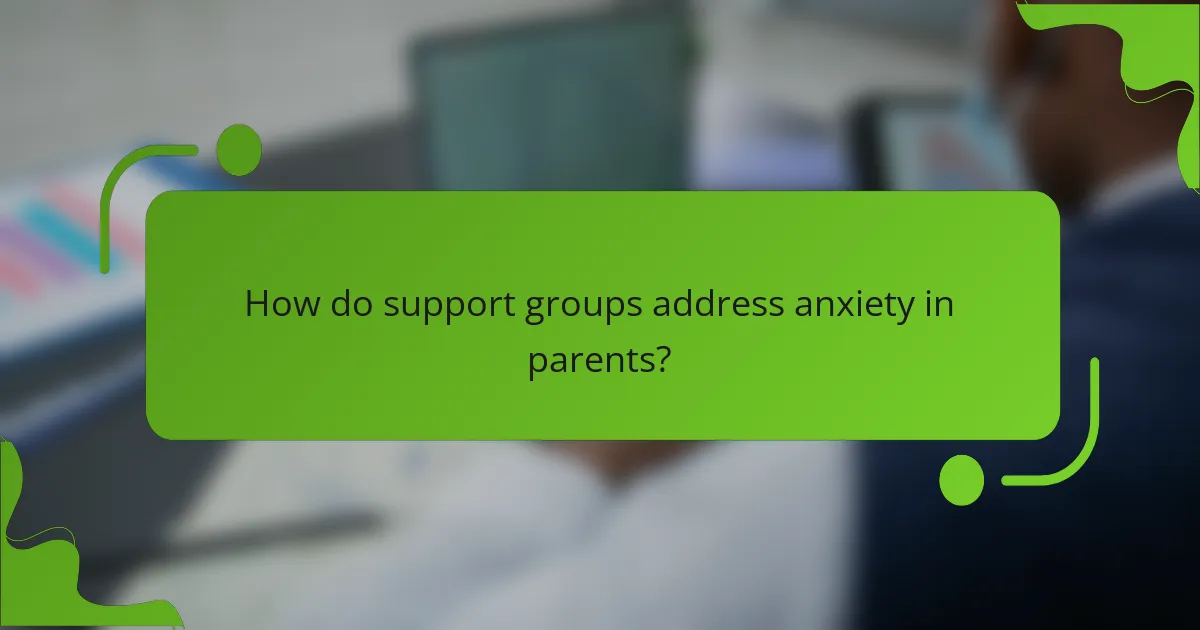
How do support groups address anxiety in parents?
Support groups help parents manage anxiety by providing a safe space for sharing experiences and strategies. These groups foster connection and understanding, which can alleviate feelings of isolation and stress.
Group therapy sessions focused on anxiety
Group therapy sessions specifically designed for parents dealing with anxiety offer structured support. Participants engage in guided discussions led by a trained therapist, focusing on common challenges and coping mechanisms.
These sessions typically involve sharing personal experiences, which can help normalize feelings of anxiety. Parents often learn practical skills such as mindfulness techniques and stress management strategies that can be applied in daily life.
Peer-led discussions on coping strategies
Peer-led discussions allow parents to share their coping strategies in a more informal setting. These gatherings emphasize mutual support, where parents can exchange tips and personal stories that resonate with their experiences.
Such discussions can cover a variety of topics, including effective communication with children about anxiety, self-care practices, and local resources available in Finland. This collaborative approach often leads to discovering new methods for managing anxiety and building resilience.

What are the unique challenges faced by parents in Finland?
Parents in Finland encounter several unique challenges, including balancing work and family life, navigating the education system, and addressing mental health concerns. These factors can create stress and anxiety, impacting both parents and children.
Cultural factors affecting parenting
In Finland, cultural attitudes towards parenting emphasize independence and self-reliance in children. This can lead to pressure on parents to foster these traits from an early age, which may be challenging for those who prefer a more hands-on approach.
Moreover, the Finnish education system encourages children to learn through play, which can conflict with parents’ expectations of structured learning. Understanding these cultural nuances is essential for parents to navigate their roles effectively.
Access to mental health services
Access to mental health services in Finland is generally good, with a strong public healthcare system that provides support for families. However, there can be waiting times for specialized services, which may leave parents feeling unsupported during critical periods.
Parents are encouraged to seek help early if they experience anxiety or stress. Local health centers often offer workshops and support groups tailored for parents, which can be a valuable resource for managing mental health challenges.
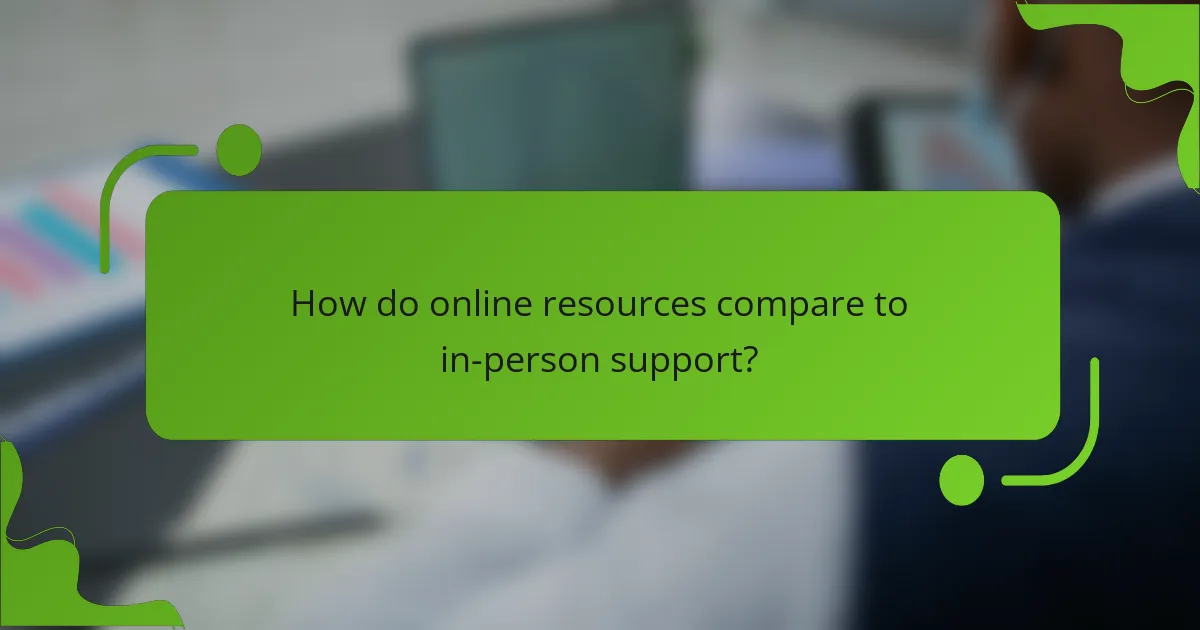
How do online resources compare to in-person support?
Online resources offer flexibility and accessibility that in-person support groups may lack, making them a valuable option for many parents dealing with anxiety. However, the effectiveness of these virtual platforms can vary based on individual needs and preferences.
Advantages of online support groups
Online support groups provide the convenience of attending from home, which can be particularly beneficial for parents with busy schedules or those living in remote areas of Finland. They often feature a wider range of participants, allowing for diverse perspectives and experiences.
Additionally, many online platforms offer anonymity, which can encourage more open discussions about sensitive topics. This can help parents feel more comfortable sharing their feelings and seeking advice without the fear of judgment.
Limitations of virtual resources
Despite their advantages, online support groups may lack the personal connection found in face-to-face interactions. The absence of non-verbal cues can lead to misunderstandings or a feeling of isolation among participants.
Moreover, technical issues such as poor internet connectivity can disrupt sessions, making it challenging to engage fully. Parents should also be cautious about the quality of information shared online, as not all resources are moderated or verified.
